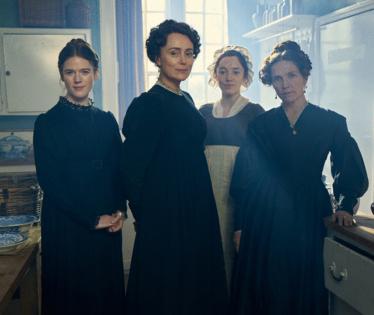'Miss Austen' review: Keeley Hawes, Patsy Ferran captivate in PBS show
Published in Entertainment News
To destroy someone’s letters, back in pre-email days, was a mild act of rebellion; to destroy Jane Austen’s letters was to alter literary history. Though the great novelist would surely have written thousands of letters throughout her life, only 160 of them survive. It is believed that her older sister, Cassandra Austen, burned nearly all of them after Jane’s death in 1817. We do not know exactly why Cassandra destroyed the letters — At Jane’s request? Concern over the family reputation? A desire for privacy? Some more scandalous reason? — and we never will. Cassandra, loyal to the end, gave history no explanation.
Nonetheless, “Miss Austen,” a lovely four-part BBC series adapted from the novel by Gill Hornby, begins streaming on PBS on May 4 and offers an entirely plausible backstory. Its title refers not to Jane but to Cassandra; traditional nomenclature at the time meant that the ranking or eldest daughter in a family needed no first name to identify her in social interactions, though subsequent daughters did (i.e., the younger sister would have been known as “Miss Jane Austen”). But the title also conveys what it must have meant to disappear behind a famous name, to be the “other” Austen sister — the one left behind.
Directed by Aisling Walsh (“Fingersmith,” “Maudie”), “Miss Austen” moves easily between two time periods. In one, years after Jane’s death, Cassandra (Keeley Hawes) rushes to the home of longtime family friend Isabella (Rose Leslie), whose father has just died. The visit is, on the surface, one of condolence, but Cassandra has an ulterior motive: She wants to find a trove of letters written by Jane to Isabella’s mother, Eliza (Madeleine Walker). And we see frequent flashbacks to earlier times, in which a younger Cassandra (Synnøve Karlsen) lives with Jane (Patsy Ferran) and their parents (Kevin McNally, Phyllis Logan) and, after a broken heart, faces a future in which her sole purpose is to take care of her brilliant sister.
Much of “Miss Austen” has the agreeable familiarity of a Jane Austen novel: the groups of women in drawing rooms, making comments that reveal far more than the actual words convey; the perpetual visiting; the dark rooms and candlelight; the tedious clergymen; the decorous romantic intrigue; the social roles from which one could not vary. Though there are decades between the two plotlines, we see moving similarities in the fates of the female characters. Isabella, grieving the death of her father, must vacate her longtime home for the incoming new vicar, and we watch as she faces the indignities of necessary cohabitation with her rather difficult sister Mary Jane (Florence Bell), a widow who does not believe in sunshine and doesn’t particularly want her younger sister moving in. In tandem, we see younger Cassandra, Jane and their mother dealing with the exact same struggles, after the death of their patriarch. The idea of home, for a woman, was something tenuous, needing a man to anchor it; poverty, in which a woman would become an object of pity, was always close at hand without him.
Though “Miss Austen” is beautifully acted throughout, even in the smallest roles (I loved Mirren Mack’s wry turn as a gimlet-eyed maid), two performances stand out — one in each plotline, though I kept picturing them together. Hawes, as the older Cassandra, has a beautifully dusky precision to her voice; this character has learned to put her own feelings away, to replace love with duty. Every now and then, though, that veil drops, and we see the passionate woman beneath.
And there’s likewise fire in Ferran’s rich portrayal of Jane, who looks like an elfin angel and whose watchful gaze misses nothing. She can be utterly charming — “I’m something of an expert in romantic matters,” she notes, a dainty gleam in her eye — or annoyingly moody, but she’s perpetually mesmerizing. You miss her in the scenes that take place after she’s gone, with those quiet drawing rooms seeming ever more still, needing her wry observations. “Miss Austen” beautifully demonstrates, however, that despite a loyal sister’s posthumous letter-burning, an author’s words can live forever.
———
'MISS AUSTEN'
How to watch: Premieres May 4 on PBS (also starting May 4, all four episodes will be streaming on PBS Passport)
———
©2025 The Seattle Times. Visit seattletimes.com. Distributed by Tribune Content Agency, LLC.













Comments